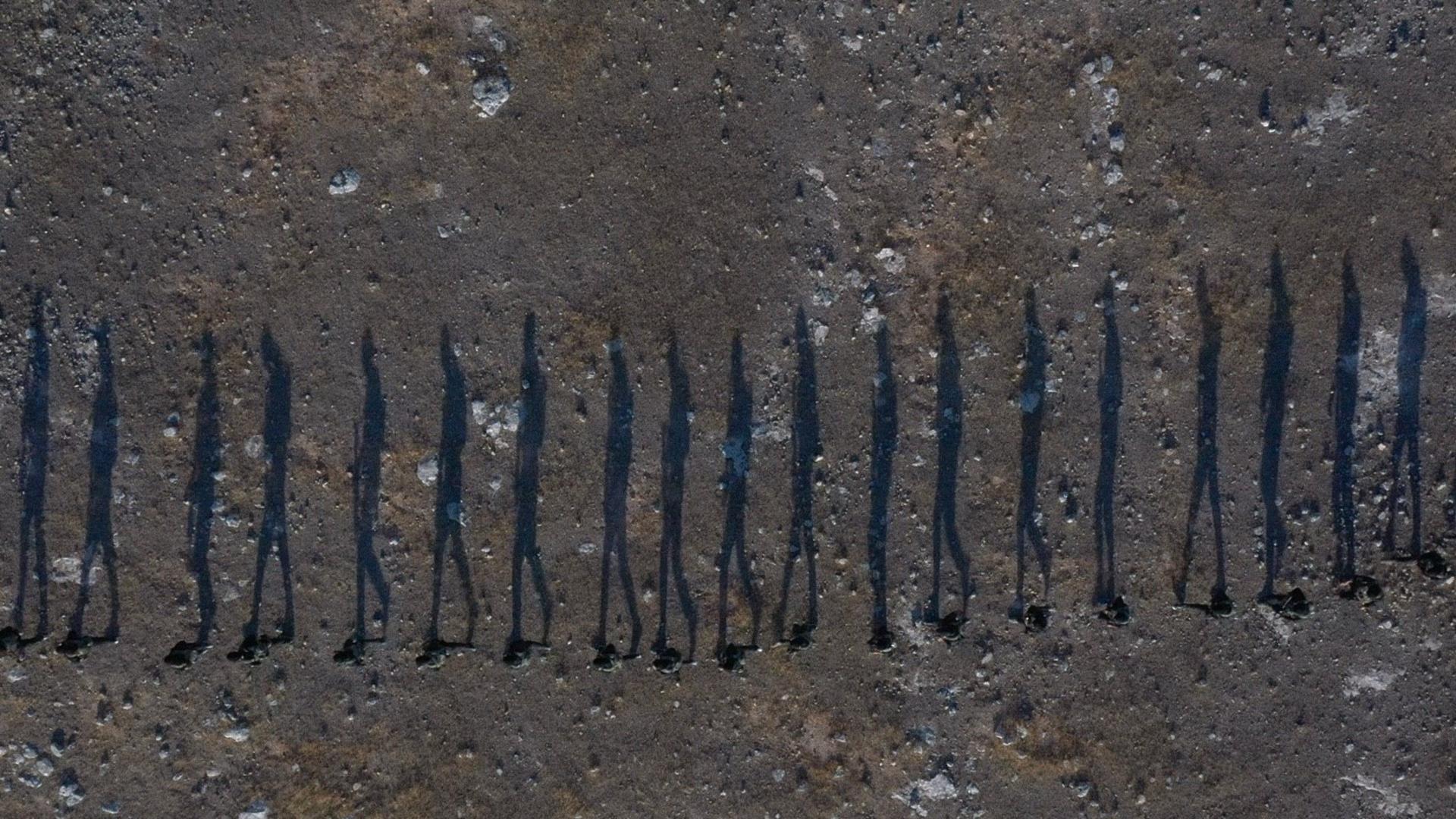
Kurdiohjaaja Zaynê Akyolin Rojek kertoo Rojavan kurdialueista Isisiä vastaan käydyn sodan jälkimainingeissa. Keskeinen kysymys on, mitä entiset Isisin jäsenet ajattelevat nyt, kun islamilaista valtiota ei tullutkaan.
Elokuvan haastatteluista saa monimuotoisen kuvan siitä, millaista Isisin alaisuudessa oli elää. Käsittelyssä on monenlaisia aiheita uskosta naisten oikeuksiin. Jotkut Isisin riveissä sotineista miehistä katuvat tekojaan, mutta muunlaisiakin kantoja on. Yksi naisista kertoo eläneensä Isisin vallan alla elämänsä onnellisinta aikaa.
Vaikka Isis olisikin kukistettu, moni haastatelluista pelkää järjestöä edelleen. He varovat sanojaan ja ovat huolissaan kostosta.
Haastattelujen ohessa elokuvassa nähdään myös kuvia elämästä Kurdistanissa. Mies tamppaa ruohopaalua sammuksiin. Naissotilas kovistelee maantien varrella tarkastuspisteellä pakettiauton kuljettajaa ja syyttää tätä salakuljettamisesta. Nämä osuudet on kuvattu kauniisti ja ne kertovat omaa tarinaansa yhteisöstä, jossa elämä on palaamassa takaisin urilleen.
Yksi kurdisotilaista sanoo, että lopulta he voivat luottaa taistelussaan vain itseensä. Lause tuntuu painokkaalta Suomen ja Ruotsinkin muutettua linjaansa kurdivastaisemmaksi Turkkia miellyttääkseen.
Juhana Pettersson
-----------
What are you gonna do when the world’s on fire? Zaynê Akyol observes a fire that burns with seemingly inextinguishable force in Rojek. – – Rojek is a work of poetic inquisitiveness years-in-the-making. The film explores how the state recovers from the aftermath of war. More provocatively, though, Rojek interrogates the longevity of peacetime as Akyol, a Kurd herself, sits down with members of ISIS to learn what motivates them. This absorbing and admirably even-handed documentary looks the beast in the eye to weigh the context, cost, and consequences of fundamentalism.
Pat Mullen, POV Magazine
Complemented by a multitude of sequences depicting the everyday reality of post-war Syrian Kurdistan, a greater part of Rojek consists of talking-heads-style interviews with individual Daesh followers. To make sense of their engagement with the group, the creators, whose presence is limited to the audible sphere as they never physically enter the frame, pose various questions to their now-imprisoned counterparts. As a result, the attention is focused solely on the Islamists who share their own personal experiences; not just what drove them to join Daesh, the nature of their role within the group and its day-to-day functions, but also how they alone feel about matters such as faith and interpersonal relationships. Finally, we are left with a strand of varied, at times even touching human stories intertwined with a shared attribute – an ultimate devotion to the rules of the highly cherished, much-esteemed religion.
Karolina Zanova, Modern Times Review
- Year2022
- Runtime127 minutes
- LanguageArabic, English, French, Kurdish
- CountryCanada
- RatingK12
- NoteOsittain tekstitetty englanniksi / Partially subtitled in English
- DirectorZaynê Akyol
- ScreenwriterZaynê Akyol
- ProducerAudrey-Ann Dupuis-Pierre
- CinematographerNicolas Canniccioni, Arshia Shakiba
- EditorMathieu Bouchard-Malo
- ComposerRoger Tellier-Craig
- Sound DesignSylvain Brassard, Arshia Shakiba
Kurdiohjaaja Zaynê Akyolin Rojek kertoo Rojavan kurdialueista Isisiä vastaan käydyn sodan jälkimainingeissa. Keskeinen kysymys on, mitä entiset Isisin jäsenet ajattelevat nyt, kun islamilaista valtiota ei tullutkaan.
Elokuvan haastatteluista saa monimuotoisen kuvan siitä, millaista Isisin alaisuudessa oli elää. Käsittelyssä on monenlaisia aiheita uskosta naisten oikeuksiin. Jotkut Isisin riveissä sotineista miehistä katuvat tekojaan, mutta muunlaisiakin kantoja on. Yksi naisista kertoo eläneensä Isisin vallan alla elämänsä onnellisinta aikaa.
Vaikka Isis olisikin kukistettu, moni haastatelluista pelkää järjestöä edelleen. He varovat sanojaan ja ovat huolissaan kostosta.
Haastattelujen ohessa elokuvassa nähdään myös kuvia elämästä Kurdistanissa. Mies tamppaa ruohopaalua sammuksiin. Naissotilas kovistelee maantien varrella tarkastuspisteellä pakettiauton kuljettajaa ja syyttää tätä salakuljettamisesta. Nämä osuudet on kuvattu kauniisti ja ne kertovat omaa tarinaansa yhteisöstä, jossa elämä on palaamassa takaisin urilleen.
Yksi kurdisotilaista sanoo, että lopulta he voivat luottaa taistelussaan vain itseensä. Lause tuntuu painokkaalta Suomen ja Ruotsinkin muutettua linjaansa kurdivastaisemmaksi Turkkia miellyttääkseen.
Juhana Pettersson
-----------
What are you gonna do when the world’s on fire? Zaynê Akyol observes a fire that burns with seemingly inextinguishable force in Rojek. – – Rojek is a work of poetic inquisitiveness years-in-the-making. The film explores how the state recovers from the aftermath of war. More provocatively, though, Rojek interrogates the longevity of peacetime as Akyol, a Kurd herself, sits down with members of ISIS to learn what motivates them. This absorbing and admirably even-handed documentary looks the beast in the eye to weigh the context, cost, and consequences of fundamentalism.
Pat Mullen, POV Magazine
Complemented by a multitude of sequences depicting the everyday reality of post-war Syrian Kurdistan, a greater part of Rojek consists of talking-heads-style interviews with individual Daesh followers. To make sense of their engagement with the group, the creators, whose presence is limited to the audible sphere as they never physically enter the frame, pose various questions to their now-imprisoned counterparts. As a result, the attention is focused solely on the Islamists who share their own personal experiences; not just what drove them to join Daesh, the nature of their role within the group and its day-to-day functions, but also how they alone feel about matters such as faith and interpersonal relationships. Finally, we are left with a strand of varied, at times even touching human stories intertwined with a shared attribute – an ultimate devotion to the rules of the highly cherished, much-esteemed religion.
Karolina Zanova, Modern Times Review
- Year2022
- Runtime127 minutes
- LanguageArabic, English, French, Kurdish
- CountryCanada
- RatingK12
- NoteOsittain tekstitetty englanniksi / Partially subtitled in English
- DirectorZaynê Akyol
- ScreenwriterZaynê Akyol
- ProducerAudrey-Ann Dupuis-Pierre
- CinematographerNicolas Canniccioni, Arshia Shakiba
- EditorMathieu Bouchard-Malo
- ComposerRoger Tellier-Craig
- Sound DesignSylvain Brassard, Arshia Shakiba
